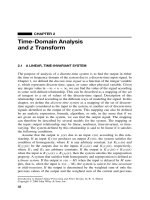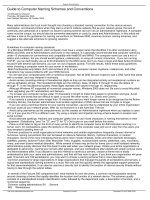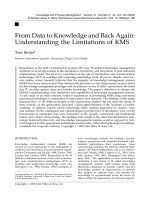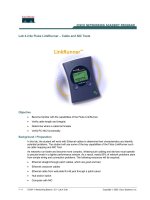Cyber Safety Guide: From Time Warner Cable and CyberAngels ppt
Bạn đang xem bản rút gọn của tài liệu. Xem và tải ngay bản đầy đủ của tài liệu tại đây (2.31 MB, 16 trang )
Cyber
Safety
Guide
From Time Warner Cable
and CyberAngels
A c
omp
liment
ary guide to
s
af
e Internet use for parents
Table of Contents
A Note To Parents 3
Common Uses of the Internet 4–11
• Surfing 4
• Chat Rooms 4–5
• E-mail 6
• Instant Messaging 6–7
• Downloading/File Sharing 7
• Social Networking 8
• Gaming 9
• Online Child Solicitation 10
• Cyberbullying, Harassment and Stalking 10–11
When to Worry 12
Tips for Parents 13
Guardian Angels/CyberAngels 14
Time Warner Cable of NY & NJ 15
Additional Resources Back Cover
A Spanish language version available online at timewarnercable.com/nynj
© The Alliance of Guardian Angels, Inc. 2007. All rights reserved.
3
Time W
arner Cable Cyber Safety Guide
Time Warner Cable and CyberAngels:
Your Partners in Internet Safety
Children today are communicating over the Internet through a multitude of
ways—MySpace, Xanga and Facebook are just some of the more than 200 social
networking websites. Add in instant messaging, chat rooms, blogging, and the
challenge for parents to keep up is overwhelming. That’s why Time Warner
Cable, your Internet service provider, and CyberAngels, a program of the
acclaimed Guardian Angels organization, have united to help you keep your
child safe. The Internet is a powerful tool, but it’s important to practice some
safety measures and common sense. We are taking the initiative to provide a
framework for you for teaching responsible Internet use to your children.
Understanding the responsibility that comes with technology is key to safety.
It’s unlikely that you would send your child out to cross the street without first
giving a lesson in safe crossing. Nor would you hand over the keys to your car
to your teen before learning how to drive and earning a driver’s license. And the
ramifications of an error in judgment online can be just as serious and long
lasting. Through this guide, we want to empower both you and your family to
use the Internet and enjoy all the positive benefits it offers.
This practical guide simplifies the complex lingo and activities that have
become a phenomenon with young people. Here you can find everything from
common acronyms to e-mail safety tips and security safeguards. Also included
are suggested topics to discuss with your child and signs of potential problems,
as well as a reference list of resources for further information and guidance. Get
helpful hints on how to monitor your child’s Internet behavior, establish bound-
aries and ensure that the experience is enjoyable, informative and all that it
should be.
We encourage you to keep this guide within easy reach and refer to it often as
you and your family continue to navigate this vast platform. After all, parenting
your child is an ongoing effort.
4
V
isit CyberAngels for more information cyberangels.org
Common Uses of the Internet
Surfing
Reading documents and visiting websites online is commonly referred to as
“surfing” or “browsing”. Visiting virtual museums, accessing public government
documents, reading complete books and viewing short films are just a few
examples of the many ways in which you can use the Internet.
Be aware, however, that unmonitored computers can give your child access to
material that is inappropriate.
Chat Rooms
“Chatting” online has become a favorite way for people to connect online in a
group (a chat room) to share similar interests. Chatting is like talking, except
that you type words rather than speak them. Typically, more than one "conver-
sation" goes on simultaneously at a given time or chat room. There are two
types of chat rooms—moderated and unmoderated. A chat room moderator
enforces rules about what is acceptable to discuss in a given chat space. We rec-
ommend children be allowed to visit only moderated chat rooms that have been
approved by you.
WHAT PARENTS SHOULD KNOW:
Cookies
Each time you visit a website, a cookie is created. Cookies are simple text files
that contain information about your travels on the web. Because the data con-
tained in a cookie may reveal personal information about you, you should
learn to set the proper security controls on your browser software.
Visit www.cyberangels.org for more information on managing and securing your browser.
5
Time W
arner Cable Cyber Safety Guide
ACRONYMS PARENTS SHOULD KNOW:
TALK TO YOUR CHILD ABOUT
Nicknames and Profiles
Avoid choosing provocative or identifiable nicknames. Keep personal informa-
tion out of your online profile.
Receiving Files
If you are accepting files from someone you do not know, or even from a friend,
be aware that files can carry a virus that may corrupt or delete data from
your computer.
Strangers
Teach your child not to chat with online strangers.
Etiquette
Good etiquette should be used on the Internet as you would in person. While
chatting, refrain from making comments that would be considered inappropri-
ate or offensive in verbal conversation.
AFK / BAK
Away from keyboard/
Back at keyboard
121
One-to-one
ASL?
Age, sex, location?
PA/ PAL/ POS/ P911
Parent alert/Parents are
listening/ Parents over
shoulder/ Parent alert
NIFOC
Naked in front of computer
MorF
Male or female
SorG
Straight or gay
LMIRL
Let's meet in real life
TDTM
Talk dirty to me
ADR
Address
WYCM?
Will you call me?
F2F
Face to face
WRN?
What’s your real name?
WUF?
Where are you from?
53x
Sex
Cyber
Cybersex, sex over the
computer
WTGP
Want to go private?
6
V
isit CyberAngels for more information cyberangels.org
E-mail is one of the most commonly used features of computers with Internet
connections. E-mail can be used effectively in a variety of ways by children—to
write to family members and friends, communicate with teachers, even contact
famous people and experts in various fields.
Instant Messaging
An instant message (“IM”) allows two or more people to talk by typing back and
forth in real time. IM programs usually appear on screen as boxes of some kind,
a split screen, or small screen where the typed messages are passed back and
forth. Some of these programs allow you to see what the person is writing as they
are writing it.
E-MAIL SAFETY TIPS
Select “Smart” Passwords
Choose a password that is not easy for a hacker to guess, preferably one that
includes upper AND lower case letters, as well as one or two numbers. Don't
share the password with anyone.
Don't open suspicious attachments
Never download or open attachments from people you don't know. Be careful
opening attachments from people you DO know—the message may be spoofed
(the return address may be fake), or it may be that your friend’s computer is
infected with a virus.
Spam
Do not respond to spam (unwanted e-mails). Many e-mails include an "unsub-
scribe" link that will actually verify your address to spammers—
resulting in even more spam.
Log Out
If you are using a public computer and a web-based mail system (such as
Yahoo, AOL , or Hotmail), always be sure to log out of your account when you
are finished. Just directing the browser to a new page doesn't log you out, and
leaves your account accessible to anyone else who sits down at that terminal.
7
Time W
arner Cable Cyber Safety Guide
They are usually free, easy to download, and fairly simple to operate. Many
IM programs also allow you to transfer files such as photos or music files (eg,
mp3 files).
Downloading/File Sharing
File sharing is another activity for many teens. File sharing is accomplished
through easily obtainable programs that allow users to connect directly to other
computers and copy (share) music files, movies, and other programs or files.
This use of the Internet is a security risk because the files can be infected, and
also may violate copyright protections.
DID YOU KNOW?
Some parental control software programs can filter outgoing information,
and actually prevent certain words or phrases from being typed. This type of
blocking can keep your last name, your street, school or phone number from
being sent out online. Road Runner and many other Internet service providers
offer blocking and filtering tools. To find out more information about how to
access these features, please visit roadrunner.com.
BE AWARE
Security Risks
There is a very real security risk to every user who chooses to use P2P (peer-to-
peer) file-sharing software. P2P software leaves your computer open to other
users, and the files you download could be infected with trojans, worms or
viruses, potentially leaving your computer vulnerable to attack or misuse.
Legal Implications
Individuals who share personal copies of films, television or music files on the
Internet are at risk for lawsuits.
8
V
isit CyberAngels for more information cyberangels.org
Social Networking:
Blogging and other online diaries
Children are no longer restricted to playgrounds, sports teams or malls to meet
new people. The world around them has become digital and VERY accessible.
Students can set up a free e-mail address, web pages and online photo albums
within minutes. Blogs (short for web logs) are like online journals and allow
people to share their most intimate thoughts with a worldwide audience.
Many children have discovered that MySpace, Facebook, LiveJournal, and
many other social networking sites are a great way to communicate with friends
all over the globe. They are able to post messages, photos, and list all their
favorite things about themselves. What children don’t always understand is how
public this information really is.
As parents, the best way to keep your children safe is to remind them that hav-
ing an online “personality” places them at potential risk. Information posted
online means exposure to the entire world.
SOCIAL NETWORKING SAFETY TOPICS
TO DISCUSS WITH YOUR CHILD:
•
Assume everyone has access to your site, and always will.
•
Think carefully before posting information or photos.
•
Assume that predators are looking at everything you write
and post.
9
Time W
arner Cable Cyber Safety Guide
Gaming
Gaming is another option for young people—and gaming online can be very
exciting. The thrill of competition, the ease of access to new games and excel-
lent graphic effects make this activity fun for kids. But because of the ability to
also chat with other players, safety issues should be discussed in the same
manner as chat and IM concerns.
TIPS FOR PARENTS OF GAMERS
Educate Yourself
• Carefully read the game ratings for age recommendations.
• Read the privacy policies of each site.
• Review the acceptable use terms with your child (this may also be referred to
as the Code of Conduct).
Set Limits
Suggested rules include limiting play time and never chatting with strangers or
giving out any personal information, including the child's real name or where
he or she lives.
Monitor Your Child
Read his/her chat logs and discuss language and behavior that may be
inappropriate. Point out examples within the logs and role-play ways to
handle potentially unsafe situations.
Help Choose Safe Nicknames
Encourage your child to choose non-gender specific nicknames, and be sure
that profiles do not include personally identifiable information.
Protect the Password
Tell your child to never share a password with a friend or allow someone else
to access their account.
Join the Game
Ask your children to teach you how to play the game. This exercise encourages
your child to be the teacher, and allows you to identify possible safety issues
while playing with your child.
10
V
isit CyberAngels for more information cyberangels.org
Online Child Solicitation
The most serious danger for children online is the risk of becoming a victim of
a sexual predator. Unsupervised children may find their way into chat rooms or
forums, which are proven venues that pedophiles use to lure victims.
If you suspect that your child has been approached online by a predator,
save any and all computer and/or phone communications, and report it to the
National Center for Missing & Exploited Children’s CyberTipline at
www.cybertipline.com. Contact your local police department if you suspect
your child is in immediate danger.
Cyberbullying, Harassment and Stalking
The feeling of anonymity on the web makes it a perfect playground for students
to engage in cruel behavior. A 2007 study from the National Crime Prevention
Council (NCPC) indicates that 43 percent of teens reported being victims of
cyberbullying. Cyberbullying can consist of spreading lies and rumors about a
person, insulting and targeting a student’s sexuality or physical appearance,
deceiving students into revealing personal information and then publishing it,
and posting personally identifiable information or photos without the victim’s
consent. Technology used may include cell phones, instant message programs,
chat rooms, e-mail, websites, polls and blogs.
11
Time W
arner Cable Cyber Safety Guide
TIPS FOR DEALING WITH CYBERBULLYING
Tell the person harassing you in straightforward terms, "Leave me alone, stop
harassing me. Do not contact me again."
Do not reply to anything else the harasser says. Don’t reply to e-mails, taunts
or lies.
Log all chats and IMs and print a copy as evidence. Save all e-mails and text
messages as well as voice mails or voice messages. Take screen shots as well.
Print all evidence, but keep the files on your hard drive.
In the case of e-mail harassment, you need to contact the harasser's ISP
(Internet Service Provider) and register a complaint. If an offending website has
been posted about you, contact the web hosting service. If there are posts on
a forum or bulletin board, contact the moderators.
Keep in mind that some types of bullying (threats to your child, or exposing
them to danger) may be illegal. Report such actions to local law enforcement
along with copies of the materials that you have collected.
12
V
isit CyberAngels for more information cyberangels.org
When to Worry
There are a number of signs that may signal trouble. You know your child better
than anyone else, so follow your instincts.
Screen Switching
If your child quickly changes screens or turns off the monitor when you come
into the room, it is likely he/she is viewing something they don't want you to
see. Be calm and ask them to move so that you can view the screen.
Odd Phone Calls
If your child suddenly begins receiving phone calls from strange adults (or even
other children) you may have a problem. Install a caller ID program to deter-
mine where the calls are coming from and ask your child to explain them.
Odd Hours of the Night
If your child is up typing away in the wee hours of the night, he/she may be
chatting online. This activity should be reserved for times and places that
are supervised.
Sudden Influx of Cash
If your child suddenly has more cash than can be accounted for, or shows up
in unfamiliar clothing or with gifts that you can't explain, this may be a sign
of questionable activity. A pedophile often spends a great deal of money
cultivating a relationship with a child.
Unusually Upset at an Internet Interruption
It is not normal to cry or to become overly upset when the Internet goes
down for an hour or two. This type of behavior should raise a red flag and
prompt frank discussions with your child.
Withdrawal from Family or Friends
Pedophiles work very hard to drive a wedge between children and the people
who support and care for them. The larger the gap between the child and
his /her family, the easier it is for a predator to create a relationship.
13
Time W
arner Cable Cyber Safety Guide
Tips for Parents–Talk to Your Child
Don't rely on software to do your job
Filtering and blocking programs can be a part of your Internet safety plan at
home, but they don’t take the place of an informed and involved parent.
Be proactive
Attend cyber safety classes and spend some time listening to and speaking
with other concerned parents.
Participate with your child online
Familiarize yourself with the services and programs your child uses.
Plan ahead
Talk to your child about the things that could be encountered online, and
what he/she can do.
Encourage their other interests
Children shouldn’t spend an excessive amount of time online. Encourage
them to participate in other types of activities, too.
Think "mall"
You wouldn't drop your young child off alone in a mall, so don’t “drop them
off” online either. Remember to keep an eye on them.
A time and place for everything
Keep your computer in a “common” room– where you can keep an eye on it.
Grant your child Internet access only when you are at home and awake.
Explore the Internet
Take the time to explore the use of your computer and the Internet. They are
valuable tools that can enrich the lives of every member of your family. The
more you know, the better you can protect your family.
14
V
isit CyberAngels for more information cyberangels.org
Guardian Angels—Beyond the Streets
The red beret of The Guardian Angels has become an icon for safety around
the world. Founded in 1979 by Curtis Sliwa, The Guardian Angels began as
a group of 13 dedicated volunteers who patrolled the subways, streets and
neighborhoods of New York City to combat and deter crime. The organization
has evolved into today’s global network of Angels—volunteers from all walks
of life, respected by law enforcement, welcomed by citizens and applauded
by governments.
As part of its move “beyond the streets,” The Guardian Angels responded to cit-
izens’ calls for protection from online threats with the launch of CyberAngels
in 1995. The volunteer-based CyberAngels is one of the oldest and most
respected online safety education programs in the world. This non-profit organ-
ization offers information, workshops, seminars, lesson plans and a website to
promote safeguards for children’s online activities.
With selfless dedication and passionate community service spanning nearly
three decades, The Guardian Angels stands today as a leading violence preven-
tion and safety education organization.
Whether you are a parent, educator, or even a victim, CyberAngels makes
many resource tools, free tutorials and more in-depth information or assistance
available at their website, cyberangels.org, including:
• Software for securing
your computer
• Tips on how and where to
report online crime
• Ways to encourage the best
use of the Internet
• Internet 101-learn the basics of
using your home computer
• Online seminars for parents
• Specialized sections for victims,
educators, and families
• Educational video segments
• Examples of cyber crime, signs
of cyber crime and what to do
• Information about Phishing
15
Time W
arner Cable Cyber Safety Guide
Time Warner Cable–Beyond Television
Time Warner Cable understands the responsibility it has to its customers.
Beyond offering the latest in technological equipment and service, the company
provides resources and tools that allow you and your family to use and enjoy its
services with all intended positive benefits.
The complexities of the world we live in today prompted us to create this Cyber
Safety Guide for you. The Internet is a powerful tool that carries the potential to
go beyond its practical uses for research, entertainment and communication. In
addition to security filters and firewalls, parental monitoring and an awareness of
the risks associated with the World Wide Web, we want to help you recognize
and respond to the signs of possible Internet misuse.
This guide is one example of Time Warner Cable’s commitment to education,
which includes scholarships and grants, free high-speed Internet access and
video service to public schools, internship and trainee programs, complimentary
teacher resource guides and workshops for educators. For more information about
our educational initiatives, please visit timewarnercable.com/nynj.
Time Warner Cable also offers two free On Demand channels that fea-
ture brief lessons on cyber safety, cyberbullying, safe social network-
ing, surfing the Internet, gaming and downloading. Tune to Channel
100 for Answers On Demand and Channel 1111 for Local On Demand
to view these programs.
Additional Resources
For further information, we recommend the following resources:
AOL Security Central
safety.aol.com
Cable in the Classroom
Media Smart
ciconline.org/media-smart
Common Sense Media
commonsensemedia.org
CyberAngels
cyberangels.org
Internet Safety Coalition
ikeepsafe.org
i-Safe
isafe.org
National Cable Television Assn.
pointsmartclicksafe.org
National Cyber Security Alliance
staysafeonline.org
Net Smartz Workshop
netsmartz.org
Road Runner Security Tips
roadrunner.com
Time Warner Cable
timewarnercable.com/nynj
DPT.0807.001-PAcyber_bklt
Public Affairs Department
120 East 23rd Street
New York, NY 10010
timewarnercable.com/nynj
717 Fifth Ave.
Suite 401
New York, NY 10022
cyberangels.org









